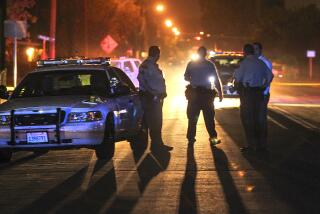Editorial: What police owe the families of people who die in custody
Wakiesha Wilson died in police custody on Easter Sunday in 2016. No one told her family that day. Or the next. When Wilson did not appear for a court hearing, her mother called the Los Angeles Police Department for information. But she was not told about her daughter’s death that day, either.
It was not until three days after Wilson died that a Los Angeles police official offered much in the way of information. And even then, the response to her mother’s questions about Wilson’s well-being and whereabouts was ominous and cold: Call the coroner.
“The death is tragedy No. 1,” attorney Jaaye Person-Lynn said in an April 6, 2016, article in the Los Angeles Times. “The amount of time it took for the family to become aware is tragedy No. 2.”
Tragedy No. 3 may be the manner in which the news was communicated. It left a family, already traumatized by a loved one’s death, angry at the police and understandably mistrustful of the department’s report that Wilson had hanged herself in her jail cell.
Respectful interaction with grieving families should be an essential part of policing and police reform.
For several years now, the nation has devoted a great deal of attention to police conduct in shootings and other uses of force, on in-custody deaths and on the need for officer training and accountability. Wilson’s death has sharpened the focus on a different but equally crucial part of the timeline — after a person has died in police custody or as a result of a police shooting — and how officials reach out or respond to families of the deceased. It’s a reminder that at the core of police reform is the public’s right to information, compassion and, above all, respect.
Not long after Wilson’s death, Los Angeles County officials made inquiries into the way families are notified of in-custody deaths by the Los Angeles Police Department’s counterpart, the Sheriff’s Department. Homicide investigators relay information. They or other sheriff’s personnel leave families with a pamphlet that describes the investigatory process, the various agencies involved and their duties and timelines.
Like the LAPD, the county can, and must, do better.
Earlier this year, the Sheriff Civilian Oversight Commission began a study of next-of-kin notifications and family assistance programs. The commission noted that existing procedures can sometimes leave survivors further traumatized.
Some family members who arrived at the scene of the death reported being treated like witnesses or even suspects; some, for example, said they were detained in the back of patrol cars as the investigation proceeded. Some described being denied information about the location of the body, or being otherwise kept from it. Some complained that the Sheriff’s Department’s just-the-facts public statements actually prejudge the incident, for example reporting (accurately, but unnecessarily) that the decedent was a “known gang member.”
There is some serious question about whether a uniformed law enforcement officer — a member of the department in whose custody the person died — ought to be the one informing the family of the death. Some county officials recommend a family assistance team consisting of mental health professionals or clergy.
Enter the Fray: First takes on the news of the minute from L.A. Times Opinion »
It’s a worthy idea, but supervisors must proceed thoughtfully. Yes, families deserve compassion and professional services to help cope with the tragedy. But they also deserve to be able to see the bodies of their deceased loved ones as soon as possible, and they deserve swift answers from law enforcement to their questions about the investigation. The county ought to provide not just emotional support but an advocate — from outside of the Sheriff’s Department — to ensure that they get information as quickly as possible.
County officials are also considering helping with funeral expenses, and attention to details such as saying they are sorry for the family’s loss. Such gestures, handled properly, are expressions of humanity without being admissions of error.
At the LAPD, a little humanity might have worked wonders in Wilson’s case. Instead, family hurt turned to family anger, and then community anger. Protesters call Wilson’s name with regularity at Police Commission meetings. An aunt threw what she said were Wilson’s ashes at then-Police Chief Charlie Beck. Wilson has rightly or wrongly become a symbol of police misconduct, and it is likely too late for reconciliation in her case.
But it’s not too late for either the LAPD or the Sheriff’s Department to learn from those mistakes. The Police Commission now monitors family notification. The county supervisors are expected to consider the sheriff oversight commission report later this month. Respectful interaction with grieving families should be an essential part of policing and police reform.
Follow the Opinion section on Twitter @latimesopinion and Facebook.
More to Read
A cure for the common opinion
Get thought-provoking perspectives with our weekly newsletter.
You may occasionally receive promotional content from the Los Angeles Times.






